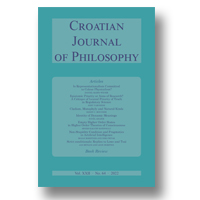|
articles |
|
1.
|
Croatian Journal of Philosophy:
Volume >
23 >
Issue: 2
Elay Shech, Michael Watkins
The Problem of Perceptual Agreement
abstract |
view |
rights & permissions
| cited by
We present the problem of perceptual agreement (of determinate color) and submit that it proves to be a serious and long overlooked obstacle for those insisting that colors are not objective features of objects, viz., nonobjectivist theories like C. L. Hardin’s (2003) eliminativism and Jonathan Cohen’s (2009) relationalism.
|
|
|
|
|
2.
|
Croatian Journal of Philosophy:
Volume >
23 >
Issue: 2
Andrej Jandrić, Radmila Jovanović Kozlowski
Transitivity and Humeanism about Laws
abstract |
view |
rights & permissions
| cited by
Humeanism about laws has been famously accused of the explanatory circularity by David Armstrong and Tim Maudlin, since the Humean laws hold in virtue of their instances and, at the same time, scientifically explain those very instances. Barry Loewer argued that the circularity challenge rests on an equivocation: in his view, once the metaphysical explanation is properly distinguished from the scientific explanation, the circularity vanishes. However, Marc Lange restored the circularity by appealing to his transitivity principle, which connects the two types of explanation. Lange’s transitivity principle has been widely discussed and criticised in the literature. In view of counterexamples, Lange refined both the principle, by taking into account the contrastive nature of explanation, and the requirement of prohibition on self-explanation. Recently, Michael Hicks has developed a new strategy for defending Humeanism about laws from the refi ned circularity challenge, critically appealing to the contrastive nature of both explanations and meta-explanations. We will argue that his strategy fails.
|
|
|
|
|
3.
|
Croatian Journal of Philosophy:
Volume >
23 >
Issue: 2
Iñigo Valero
Bare Projectibilism and Natural Kinds: A Defense
abstract |
view |
rights & permissions
| cited by
Projectibility has traditionally been given a prominent role in natural kind theories. However, where most of these theories take projectibility to be a necessary but insufficient feature of natural kinds, this paper defends an account of natural kinds according to which the naturalness of kinds is to be identified with their degree of projectibility only. This view follows thus the path opened by Häggqvist (2005), although it goes significantly further on two main respects. First, I develop and discuss two important dimensions of projectibility that are overlooked in Häggqvist’s work. Second, I address two recent important objections (Magnus 2012 and Spencer 2015) against projectibility-based accounts.
|
|
|
|
|
4.
|
Croatian Journal of Philosophy:
Volume >
23 >
Issue: 2
Maarten Van Doorn
A Tension in Some Non-Naturalistic Explanations of Moral Truths
abstract |
view |
rights & permissions
| cited by
Recently, there has been some excitement about the potential explanatory payoffs the newish metaphysical notion of grounding seems to have for metaethical non-naturalism. There has also been a recent upsurge in the debate about whether non-naturalism is implausibly committed to some acts being wrong because of some sui generis piece of ontology. It has, in response, been claimed that once we have a clear enough picture of the grounding role of moral laws on non-naturalism, this is not (objectionably) so. This move, I argue, is inconsistent with certain constraints on what non-naturalist-friendly moral laws must be for them to do the explanatory work non-naturalism requires of them elsewhere. In other words, there is tension between the grounding reply to the supervenience objection and the grounding structure implied by some responses to the normative objection.
|
|
|
|
|
5.
|
Croatian Journal of Philosophy:
Volume >
23 >
Issue: 2
Stijn Bruers
Unwanted Arbitrariness
abstract |
view |
rights & permissions
| cited by
I propose a new fundamental principle in ethics: everyone who makes a choice has to avoid unwanted arbitrariness as much as possible. Unwanted arbitrariness is defined as making a choice without following a rule, whereby the consequences of that choice cannot be consistently wanted by at least one person. Other formulations of this anti-arbitrariness principle are given and compared with very similar contractualist principles formulated by Kant, Rawls, Scanlon and Parfit. The structure of arbitrariness allows us to find ways to avoid unwanted arbitrariness. The two most important implications of the anti-arbitrariness principle are discussed: non-dictatorship and non-discrimination.
|
|
|
|
|
6.
|
Croatian Journal of Philosophy:
Volume >
23 >
Issue: 2
Huseyin S. Kuyumcuoğlu
Reassessing the Exploitation Charge in Sweatshop Labor
abstract |
view |
rights & permissions
| cited by
One common argument against sweatshops is that they are exploitative. Exploitation is taken as sufficient reason to condemn sweatshops as unjust and to argue that sweatshop owners have a moral duty to offer better working conditions to their employees. In this article, I argue that any exploitation theory falls short of covering all standard cases of sweatshops as exploitative. In going through the most prominent theories of exploitation, I explain why any given sweatshop can either be wrongfully exploitative or not, depending on the exploitation theory being considered and the circumstances of the application. I conclude by suggesting that sweatshop critics had better find other reasons besides the charge of exploitation to protest or interfere with these workplaces.
|
|
|
|
